Range Rover Velar 2019 Top Speed
Range Rover Velar 2019 long-term review
From £44,830
Can the road-biased Land Rover step out from its storied siblings' shadow? We had six months to find out
Why we ran it: To see if this newest twist on the Range Rover formula is worthy of the badge – and its price
Month 5 - Month 4 - Month 3 - Month 2 - Month 1 - Prices and specs

Life with a Range Rover Velar: Month 5
It racked up 10,000 miles quickly, which tells you something. But in the cold light of day, now it has gone, how do we rate it? - 27th November 2019
Still I can't put my finger on it: just what is it about the Range Rover Velar that makes people want to find fault with it on first acquaintance? It's a strange one because, having racked up 10,000 miles quicker than in any other car, I've found it to be the most modern and one of the most likeable SUVs of any size or type on the market.
Our 'Why we ran it' statement, above, is a polite way of putting what that initial perception of the Velar seems to boil down to: that it isn't a real Land Rover and is merely a reskinned Jaguar F-Pace, albeit with an extra £10,000-plus on the sticker price, in a fairly cynical extension of the Range Rover brand. Over the course of this test, we've found otherwise.
Although it is the most road-biased Land Rover yet produced, we found on a day trip to Land Rover Experience West Country that the Velar can still do pretty much what any other Land Rover can do. The absence of a separate low-ratio 'box excludes only rock crawling, so all muddy tracks, river wading, steep ascents and descents and even extraordinary-looking cross-wheel articulation balancing acts are fair game. That you can drive home from the venue in such comfort is almost implausible, given the things the Velar can do off road.
Arguing in favour of that £70,000 price in the second part of our opening statement becomes trickier, yet the Velar feels a step up from the F-Pace in terms of refinement, comfort and, biggest of all, interior ambience, technology and perceived quality. A £10k step up? No, not quite, but this emphatically feels like a true Range Rover, and the most modern interpretation of one yet. And, as we know, Range Rovers have proven that they can command a premium with buyers.
Yet before we move on from that price, it must also be looked at in the context of the depreciation we have seen on this Velar. It has lost more than £30,000 in its value since new as a trade-in, a huge sum even for a two-year-old car with more than 20,000 miles on it, and it shows what the used market thinks of the Velar's lofty pricing when new.
I've hunted around online classifieds sites to check if there's any anomaly in our figures, but dealers have similar-age, spec and mileage models from around £42,000, which is actually a bit less than the dealer value we were quoted. At that price, the car's undoubted qualities really start to make sense.
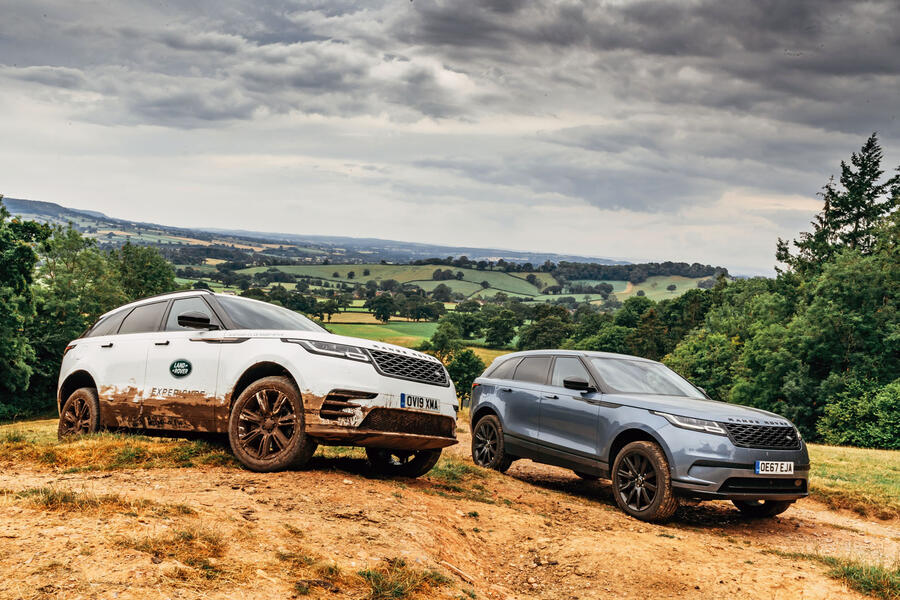
The biggest quality of all is that interior and, more specifically, what our car was trimmed in. Its premium textile trim has altered my perception of how a luxurious cabin needs to be fitted out. Spend time in this particular Velar's cabin and then go back to something wrapped in leather, even a Bentley, and it feels like yesterday's idea of luxury. When you factor in the environmental side of the premium textile material, given that it's recycled, the case for it becomes all the more compelling.
'Modern' is the word I keep coming back to, but it defines so much of the Velar. It's as big as its rivals – the likes of the Mercedes-Benz GLE Coupé and BMW X6 – but is in no way brash like those. The shape of the car is lovely and the styling simple and even elegant. It has concept-car-style looks and, even two years after its launch, turns heads in the way that no other SUV does. I think this car is going to age very well indeed.
What we did find is that the Velar is spec dependent in justifying its luxury credentials. Under the bonnet, the Velar really needs more than four cylinders, which pushes the price up even further. With four cylinders, there isn't enough grunt to move what is a big, heavy, two-tonne SUV, economy in the real world suffers drastically and the refinement is not at the premium levels the rest of the car exhibits.
I also tried the Velar with eight cylinders, courtesy of the big 5.0-litre supercharged V8 that powers the SVAutobiography model, but you never get over the economy that resides in the teens no matter how supreme the refinement and low-end torque are. V6 diesel power it is, then, for the ideal mix of refinement, easily accessible torque, passing ability and real-world economy and range.
Most types of drive were covered during the rapid spinning of the odometer. The Velar was at its best on the open road, making motorway journeys pleasures rather than chores, given how comfortable and relaxing it was. It was a surprisingly involving steer on country lanes, far more so than other Range Rover models. The Velar was more a struggle in tighter spaces in town, the low driving position, long bonnet and slim glasshouse making it tricky to place at first.
I must admit I, too, had my doubts about the Velar at its launch and soon after. At its original presentation, it was quite cynically described as simply filling a huge price gap between the Range Rover Evoque and Range Rover Sport, rather than being an innovative and modern (that word again) product in its own right. Indeed, I've never heard a car's price point laboured so much, which is quite remarkable when the Velar is anything but a box-ticking exercise in the way so many other joyless cookie-cutter cars are 'created'.
Instead, the Velar shows Land Rover at its most creative, forward looking and ambitious – pricing included. Above all else, it deserves you keep an open mind about it.
Second Opinion
It took a few long-distance drives for me to gel with the Velar. Urban commutes only highlighted its unintuitive infotainment controls and unwieldy dimensions but, outside the city, it's a fantastically refined cruiser. I'd say the V6 is the pick for not just economy but also smoothness at speed.
Tom Morgan
Back to the top
Love it:
Interior ambience Lovely materials and nicely integrated tech – and not entirely at the cost of old-fashioned buttons.
Boot space Don't be fooled by that rakish roofline: the Velar's boot is vast and a real usable space.
Exterior styling Looks great as a wedding car, looks great covered in mud… looks great anywhere, basically.
Loathe it:
Standard infotainment InControl system is clumsy and often slow. Good job you can get an Apple CarPlay upgrade.
Depreciation Eye-watering, really. Still, it makes for a very fine pre-registered or nearly new car…
Final mileage: 20,899
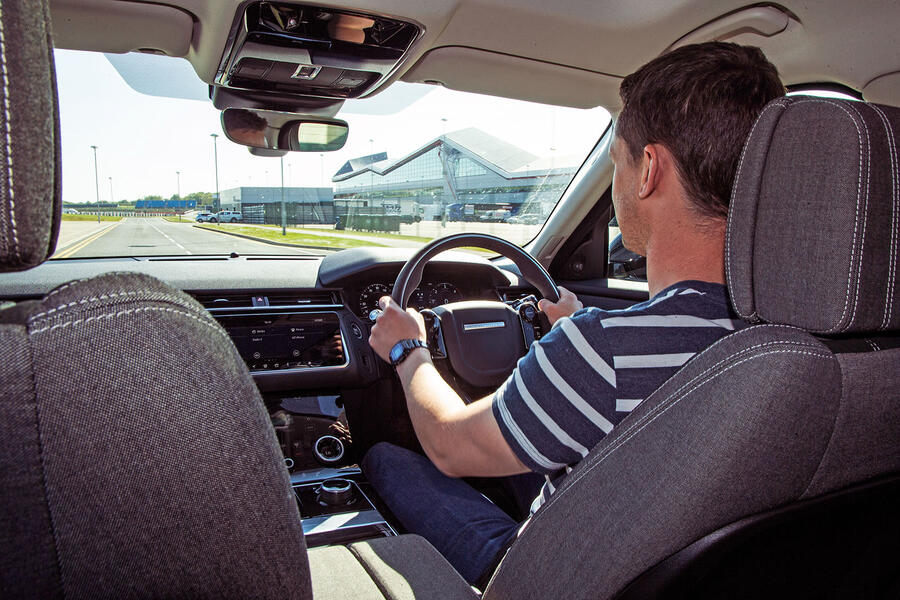
Back to the top
Life with a Range Rover Velar: Month 4
A switch from V6 diesel to V8 petrol adds power – and more fuel stops - 30 October 2019
There's more than just a different colour to the Velar pictured below compared with the one you've been seeing on this page in recent weeks. With the clock on this story ticking down, the miles racking up in record time on that V6 diesel and our desire to explore the breadth of the Velar's range, the oil-burning Velar is now back with Land Rover.
More on that next time, but in its place, and quickly racking up miles of its own (though that 20k odometer reading above applies to the departed V6 diesel, as this new Velar's appearance here is a one-off), is this new range-topping SV Autobiography Dynamic version. Its name is too much of a mouthful, so it's best described as the Velar V8.
Just don't call it the hot Velar. Yes, it's 'hot' in the sense it has a 542bhp supercharged V8 petrol engine, the likes of the steering, suspension, transmission and four-wheel-drive system have all been given a sportier tune, and those quad exhausts aren't exactly shy and retiring. Yet it's still not an out-and-out performance machine in the way its Jaguar F-Pace SVR sister car is. Land Rover is keen to increase the luxury (hence Autobiography) just as much as the performance (which is where the Dynamic part of its name comes in).
Big petrols are rare these days, and it doesn't take too long to work out why when you look at the car's CO2 emissions (270g/km) and the average economy of 23mpg, which can be a stretch to hit unless you maintain the steadiest of paces on quiet roads. Economy, which is barely half that of the V6 diesel, means double the fuel costs, and double the petrol station stops to allow the credit card to be deployed, too.
It doesn't feel very 2019 – at least not in the UK where we don't benefit from the same fuel prices as the likes of the US and Middle East where this will find the greatest success. (Intriguingly, this is the first thing any colleague mentions when they try the car.)
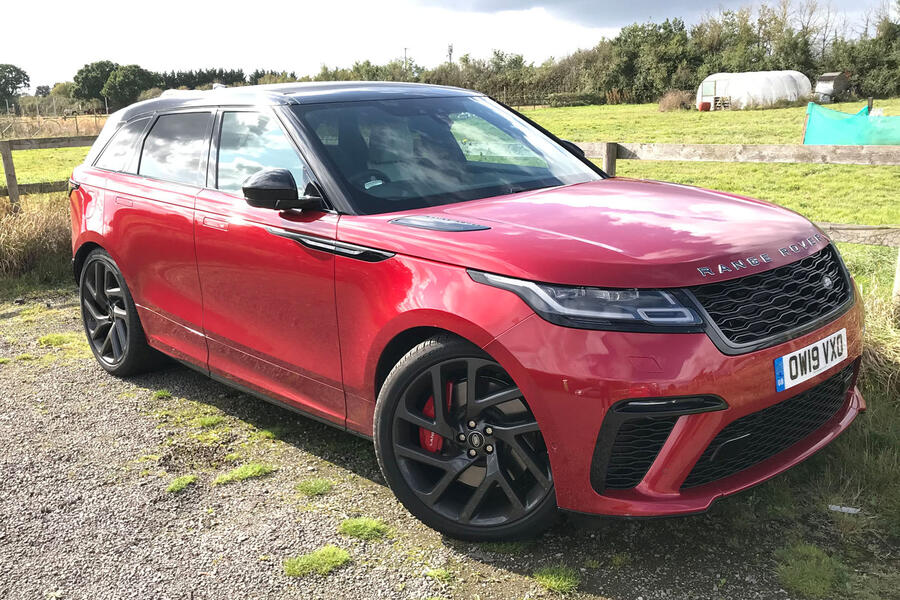
But then it was ever thus with big petrols, the trade-off being just how effortless the power delivery is, and how refined it is. To the former point, the engine almost feels Bentley-like in how it delivers its low-down torque, with an added pleasing little growl from the exhaust to remind you that this remains a potent engine with a real turn of pace.
Also of note is its refinement. The V6 diesel Velar is quiet and refined already, the V8 even more so. If the brief of any range-topper is to build on the very best of the standard model on which it's based, then Land Rover has pushed the Velar in the correct direction. To lose that sense of calm and refinement in pursuit of raucousness would have created quite an odd car.
There's one area where upping the luxury over our departed V6 diesel hasn't hit the mark, though, and that's with the interior trim. While the perforated Windsor leather is lovely to the eye and to the touch, it actually doesn't feel as special or anywhere near as modern as the premium textile interior in our other Velar. That previous cabin made a real statement about modern luxury, to the point where going to leather feels like a backwards step.
Intriguing as it's been to try the V8, it's our departed V6 diesel Velar I feel myself pining for, and that cabin is the biggest reason why. That it also doesn't lose much in the way of refinement and performance in the real world goes to show just how relevant larger-capacity diesel engines are for powering the big, heavy SUVs so many buyers can't get enough of.
Long live diesel, then, but also bravo to Land Rover on creating the right kind of flagship for the Velar.
Love it:
B-road handling Chassis tweaks make the Velar a surprisingly engaging B-road steer.
Loathe it:
Leather-wrapped steering wheel Too slippery in your hands. The cloth wrap of the V6's wheel felt and gripped better.
Mileage: 20,777
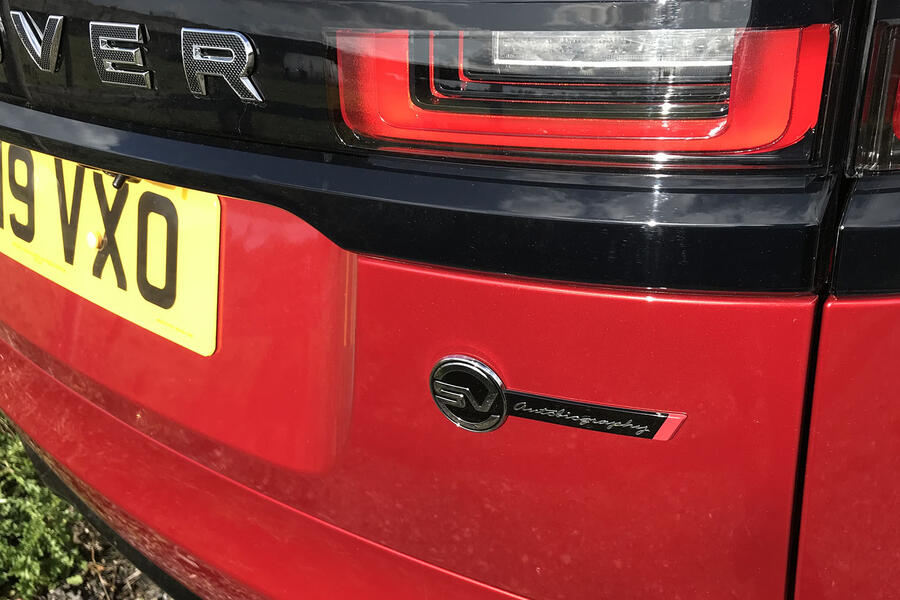
Back to the top
An Apple a day keeps InControl at bay - 23rd October 2019
Now I've got Apple CarPlay fully up and running in the Velar, I've not spent a single journey since using the in-built InControl infotainment system. CarPlay relies on a wired connection and the Velar's USB ports are in the deep storage bin in the armrest. That means, unlike in some cars, everything is left tidy and unobstructed.
Mileage: 20611
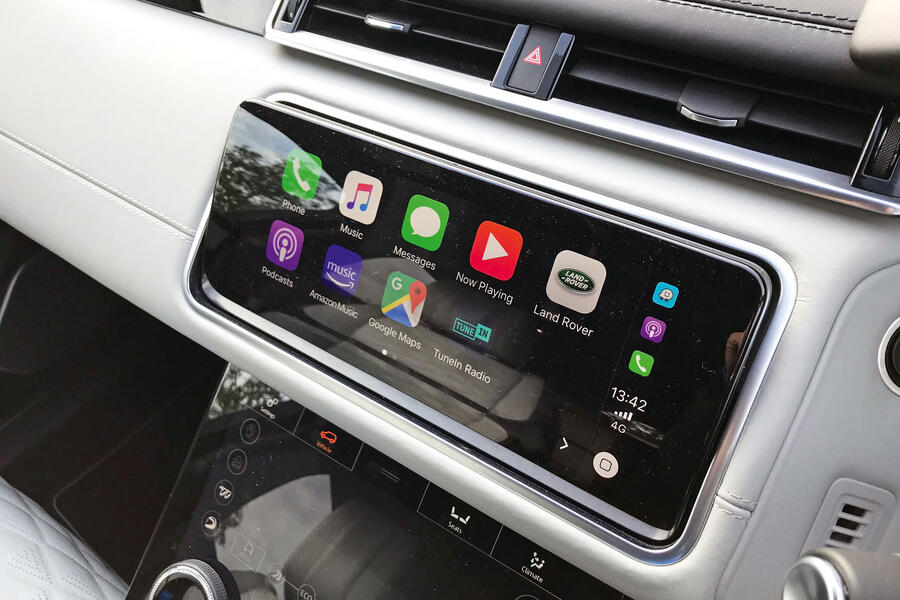
Back to the top
It's a stag-do off-roader and luxury wedding car rolled into one - 9th October 2019
The Velar has a little green badge on the front grille and another on the tailgate that you'll know well. It says Land Rover. For however plush and premium and new-type-of-Range-Rovery the marketers say it is, and no matter what the average farmer may think, the Velar is proving itself to still very much be a rough-and-tough Land Rover. That much we found out quite literally in my 7 August report when we took it off road, but what's now emerging as the miles really pile on is just how versatile and usable it is every day – the other side of Land Rover.
There's a whole series of little things that make it so. Let's take the material that lines the boot floor and back of the rear seats. It's a very hard-wearing fabric, designed by engineers to work properly, not simply to look nice.
It's the type that if you carry a couple of sawn-off planks of wood on it, the shavings and sawdust don't get tangled in the carpet weave and never come out. And it's even wipeable to the extent that should your dog regurgitate her breakfast during a drive later that morning, there's no lasting damage. This is a car to be lived with, and its makers have really thought about how it will be used – more than just for posing in. That extends to the front seats, too. The 'premium textile' fabric is comfortable, nice to the touch, hardwearing and, with its wool blend, able to keep you cool in the summer and warm in the winter – it really does make leather seem old hat. It feels indestructible, too.
Ironically, it's some of the things that the Velar has all to itself to help distinguish it from the rest of the Land Rover range where the mask slips. In dialling up the sportiness and on-road manners, the secondary ride, with its tendency to crash over bumps, is not as good as its more easy-going big brothers – even one with 'Sport' in its name.
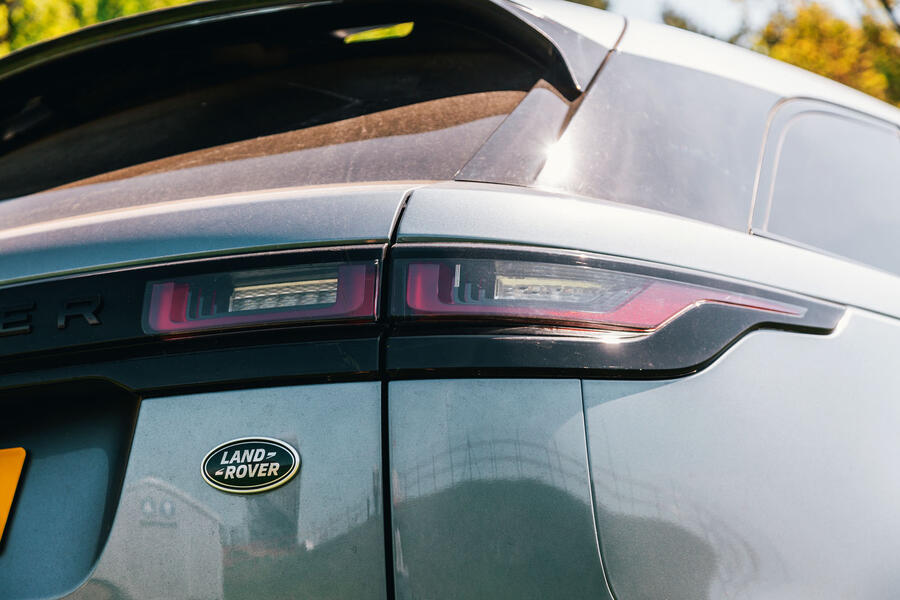
And the debate will never truly be won by Land Rover in regards to the Velar's lofty pricing, given the considerably less expensive Jaguar F-Pace is as good to drive if nowhere near as nice inside.
A chink in the Velar's interior armour had emerged, though. I had decided to use the Waze live mapping app on my phone instead of putting up any longer with the Velar's infotainment system and confusing satellite navigation. Trouble is, with the car's thick glazed roof, my phone struggled for signal propped upright in the cupholder next to the charging port.
Then Land Rover announced Apple CarPlay – which brings your iPhone's display to the central screen and allows the use of apps including Waze – would be made available in certain models, and the problem was solved. So slick is CarPlay that I do wonder why car makers go to such lengths to develop their own proprietary systems. No doubt data capture is one of the reasons. Land Rover took our car back to its HQ to do the upgrade, but readers have reported a £200-plus VAT quote from dealers.
As wedding season reached its peak, the Velar was used for some longer journeys towards the back end of the summer. The rural north Norfolk country house where my friends Sam and Georgie got married provided a great backdrop for the Velar to show off the style and class it undoubtedly has. And it looked and performed like it was right at home on the rough stuff there too, as all Land Rovers always have.
Love it:
Apple CarPlay This upgrade has given the Velar the software to finally match its glitzy hardware.
Loathe it:
Long nose 'Loathe it' is strong, but jumping in and out of other cars reminded me just how long the Velar's nose is and how far back and low you sit. Looks great, but position with care.
Mileage: 19328
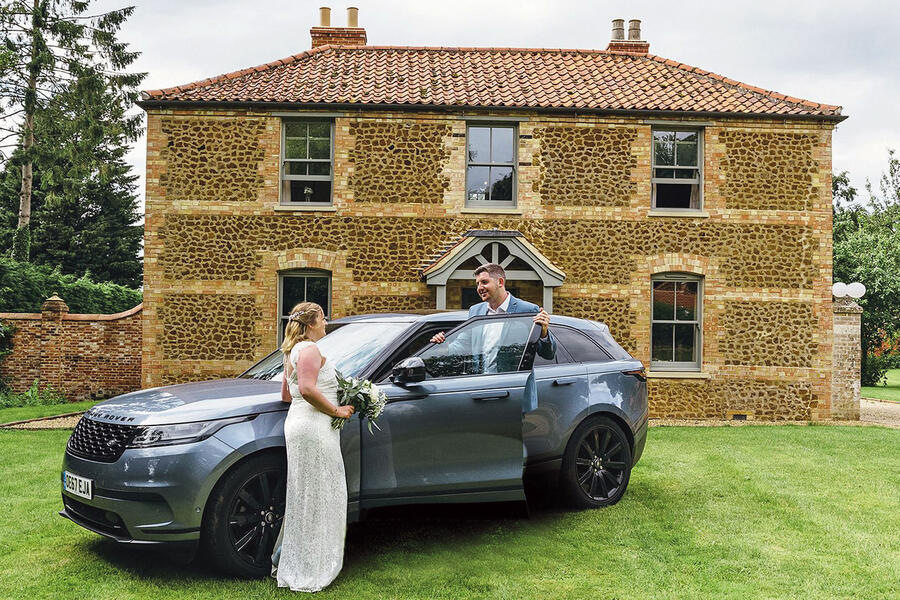
Back to the top
Life with a Range Rover Velar: Month 3
Always listening, always learning - 14th August 2019
As I mentioned last time, the Land Rover Experience off-road centres try to act as guides to your car and its features in general. There, instructor Will McKean showed me how to pre-select reverse (or drive again) on the rotary controller even when you're moving forwards. It's so handy when you have to perform a quick reverse into a driveway off a busy road, as I do.
Mileage: 16,411
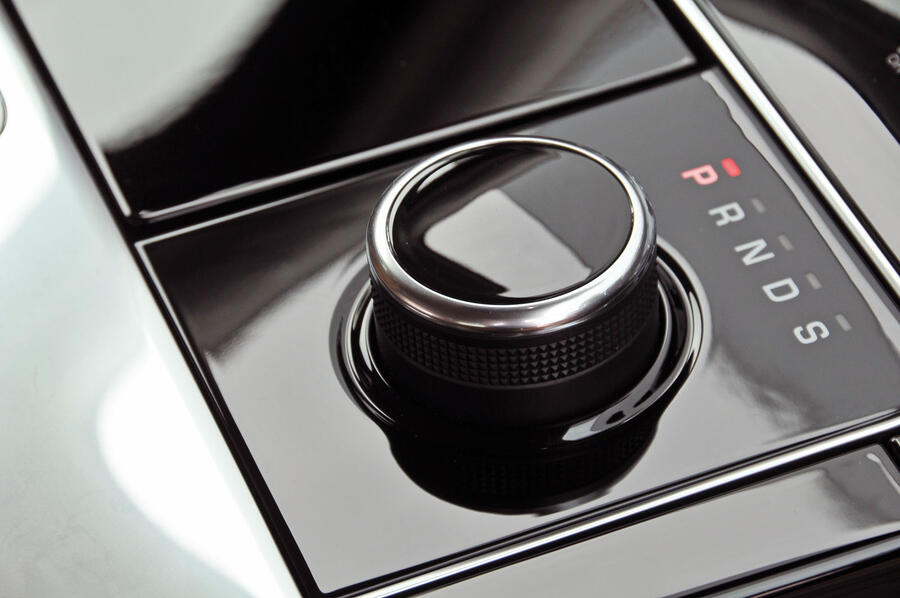
Back to the top
Most won't use their Velars off road, but here's proof you can if you choose to - 7th August 2019
As road trips go, a recent one in the Range Rover Velar was one of the more unusual. The quiet, comfortable 150-mile drive was unremarkable, but once we arrived at our destination, things got more interesting. The car managed to get on two wheels, as the picture below shows, while conquering one of many extreme obstacles, and it, and we, emerged without a scratch for an equally relaxing and unremarkable 150-mile drive home.
The term 'road-biased' is oft used to describe the Velar, but as our day at the Land Rover Experience West Country (LREWC) in Honiton, Devon, showed, that's very much a relative term.
While most road-biased 4x4s/ SUVs/crossovers are capable of conquering the puddles and potholes of the gravel car park at the village hall and little else, the Velar is merely more road biased when compared with other Land Rovers in the range.
It does without the low-ratio gearbox (and our car also came minus the optional locking rear differential with which the Velars at LREWC are equipped), but the Terrain Response 2 system – a clever piece of electronic trickery that adapts the car's traction intelligently to suit the conditions below its wheels – is largely the same as those of the larger Range Rovers in its tuning. No low-ratio 'box rules out rock crawling, but pretty much everything else is fair game: river crossings, steep ascents and descents, implausible-looking terrain and, of course, getting up on two wheels.
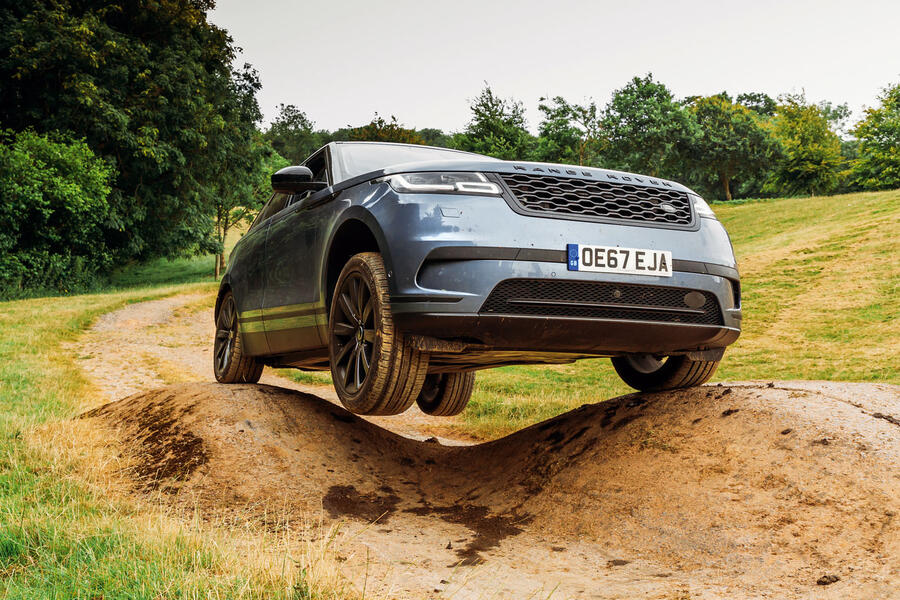
The Velar's air suspension is closely related to that of the Range Rover Sport, yet the Velar's is very much tuned to road use. So while the tuning of the suspension allows for a softer, more comfortable ride on road, the trade-off is a firmer ride off road, because there's less travel left in the springs when the Velar's ride height is raised to its maximum.
The Velar's ground clearance is also less due to its low, sleek, road-hugging shape, all of which means you need to make slower, steadier progress off road. Yet on our course at LREWC, we go everywhere the lead Land Rover Discovery can go (Disco being the most capable off-roader Land Rover has yet built, remember).
We're used to seeing Land Rovers do quite extraordinary things off road, yet to see the Velar do the same is even more impressive. LREWC has a series of mirrors next to its more dramatic man-made obstacles, which require a double-take as you spot the Velar at an implausible angle doing its best impression of a trapeze artist.
As Land Rover makes more and more road-biased cars, the temptation could be there to sacrifice that off-road capability. Yet to do so would lose the authenticity of the brand: the Velar is credible as a Land Rover because of what it's capable of off road, no matter how shiny and new it looks from the outside.
The LREWC centre has recently undergone a refurbishment and gained a new visitor and conference centre. From there, the 8000 or so people who come through the facility each year drive across the 120-acre estate, taking in 45 acres of woodland where the toughest terrain lies.
You can also tap the knowledge of the instructors, such as Will McKean, who are the ultimate product experts. Will can not only help you drive over a mountain but also describe in detail the infotainment system and help make it easier to use.
Any new or approved used Land Rover can come and do this, and I urge you to do so. Even if you have no intention of using your car this way (and let's be honest, most Velar owners in reality won't plan on it), to drive it this way is as breathtaking and impressive as it is plain good fun.
Love it:
Economy Can now return more than 40mpg on a long run – it's the big V6 diesel's latest party piece.
Loathe it:
No Apple CarPlay Not yet, anyway, but the infotainment is about to get a software upgrade…
Mileage: 16,100
Back to the top
Life with a Range Rover Velar: Month 2
Retractable handles open up a whole new debate - 10 July 2019
There's lots of talk over the Velar's door handles, which pop out when the doors are unlocked and sit flush in the body when the car is locked or on the move. Opinions range from they're brilliant to that's just something else to go wrong (and our own Matt Saunders managed to lock himself out of an Evoque with the same handles recently – his fault). Me? I'm somewhere in the middle.
Mileage: 15,220
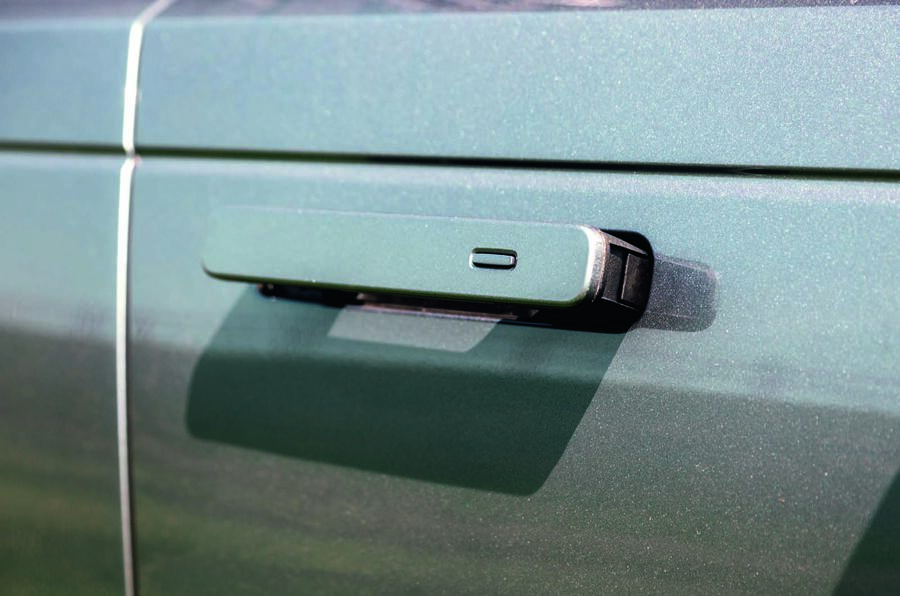
Back to the top
Luxury wheels and a car-sick dog. What could go wrong? - 3 July 2019
A Range Rover is also a Land Rover. Yes, there's all that luxury and sense of peerlessness in the way Range Rovers of all sizes and prices waft around, cosseting owners in a much warmer way than any German car could, yet as a Land Rover and a Range Rover, this must not be at the expense of everyday usability, practicality and versatility.
We've heard about the Velar's origins before – that it's based on a Jaguar F-Pace (a car that starts at around £10,000 less) and therefore does without a separate low-ratio gearbox – so there are those who will question its true 'Land Roverness' straight away. We're planning a hardcore off-road drive at a Land Rover Experience centre next month to settle that debate.
But mucky stuff aside, how good a Land Rover is the Velar? Getting the car coincided with me also getting a dog for the first time. These two things were unrelated, I assure you, yet have allowed me to properly explore the Velar in that 'lifestyley' way Land Rover would at least like to think most of its cars are used.
Starting back to front, let's look at that boot. The tailgate is remote-operated, which is convenient when you've got your hands full, but is not split in the fashion of the full-size Range Rover, which has always been handy for opening down as a shelf to sit on and take cover while your wellies come off. A by-product of that is the boot entry into a full-size Range Rover is completely flat, whereas in the Velar there's a slightly irritating step down from the lip, which is at least protected by a scuff plate.
In the boot, there's the good kind of hard-wearing carpet that not even a sharp-clawed greyhound could pluck yet is also easy to wipe clean. While not as fancy as the fabric in the main cabin, it's far more useful and is a welcome case of substance over style.
There are a couple of handy hooks there to hang bits off as well as controls to adjust the ride height and make access to the boot higher or lower. Those rear seats fold 40:20:40, which is perfect for allowing the dog to be tethered, peer forwards and sit safely in the boot without getting mucky paws on the back seats.
I'm pleased to report, then, that the design department's desire to give the Velar such a dramatic, swoopy shape hasn't compromised space or practicality from the rear seats backwards.
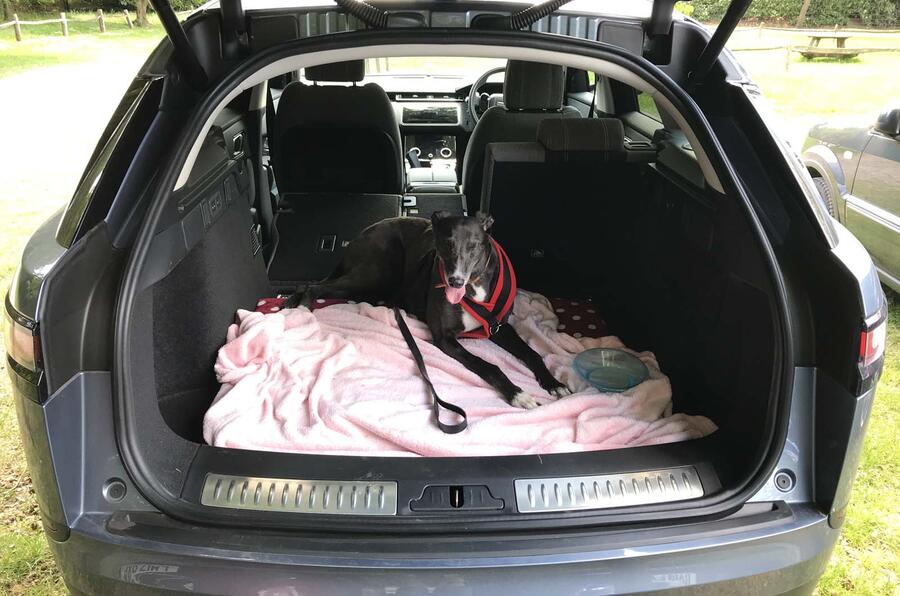
Having a dog that is prone to car sickness tunes you into another level of vehicle dynamics. Which is an area where six-cylinder-plus Range Rovers have always scored highly – in their smooth, linear power delivery. They're actually two-paced, but in a good way: nice to drive around slowly with gentle throttle inputs, yet with enough torque and then high-speed responsiveness for brisk motorway performance. The torque-convertor automatic is proving a good match for the V6 diesel in this D300 model, and economy is also usefully improving towards 40mpg.
The ride doesn't quite have the pillowy smoothness and absolute isolation of the full-size Range Rover, despite the Velar's optional air suspension. It's smooth and supple at speeds low and high, one of the few blots on the copybook being the low-speed secondary ride. Those 18in alloy wheels look big and heavy, and they occasionally feel it over brittle surfaces at lower speeds, too, in a way that a bigger Range Rover on even larger wheels wouldn't.
Whatever you think of it, on the road and in terms of its daily usability, the Velar can wear that Land Rover badge guilt-free.
Love it:
Glass roof Big panoramic roof floods an already brightly trimmed cabin with even more light. Makes a change to the sea of black leather usually found in the class.
Loathe it:
Auto headlights They're a bit rude to other road users, dropping down a good couple of seconds after I would. I keep being flashed as a result…
Mileage: 14,811
Back to the top
Life with a Range Rover Velar: Month 1
Go in with an open mind - 12th June 2019
I've got this nagging sense about the Velar that people don't want to like it. That it's too flash, too expensive. So they don't approach it with an open mind and come loaded with negative preconceptions. But whatever you think of it, the Velar is a fantastically designed and desirable product with real innovation born right here in the UK. It deserves an open mind.
Mileage: 14,111
Back to the top
Racking up 3000 miles in a couple of weeks, including a family road trip to St Ives - 5th June 2019
Cornwall: first stop for our new Range Rover Velar. Barely five minutes after it had arrived, photographer Jed Leicester took away his family in it to the south-west for a bank holiday break and instantly put the Velar under the strain of a fully loaded family road trip.
So speedy was Jed to grab the keys that he even beat me to any kind of meaningful drive. Jed's big journey south plus the few cross-country drives on business that I've done since to get my own first impressions mean that the mileage figure is already 3000 up from when we took delivery (with 10,000 already on the odometer, remember) in just a couple of weeks.
That allows those first impressions to be a bit deeper and more varied than normal. The odometer's rapid rise is also a good indicator of a car that people really want to get to know.
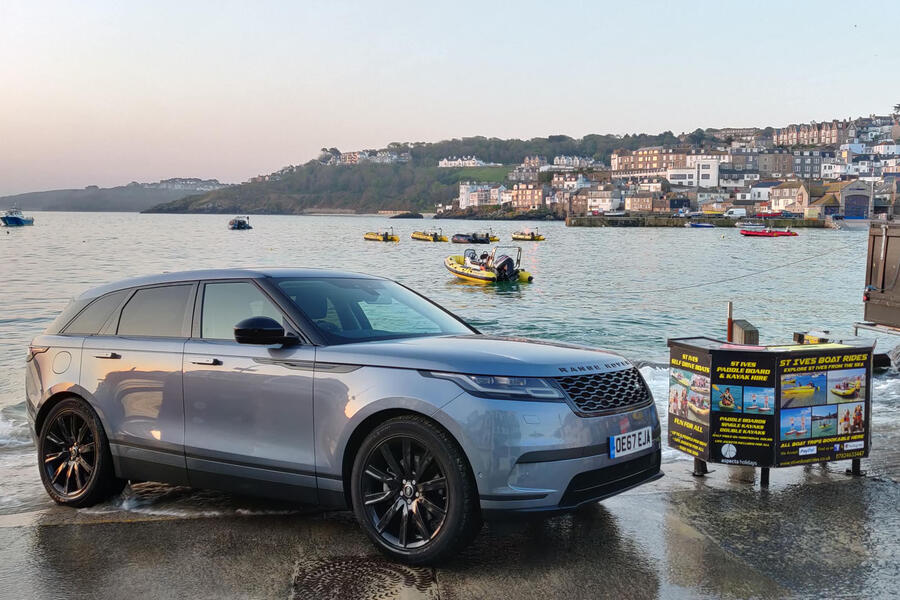
Jed's drive was far more visually interesting than any of mine and took him to deepest St Ives. But having a wife and two kids and not being a hardened road tester meant his eye for looking at the car was different from mine, and his top-line report ("very nice, comfortable and luxurious") invited further digging.
Interestingly, the first thing he went into detail about was the parcel shelf. "Breathe on it, and it springs open," he told me. He's right: the shelf is actually a retractable cover on a roller wheel and it's somewhat on the 'springy' side. Yes, the car isn't a Discovery and thus doesn't have ultimate versatility in mind, but you do expect better from a £70k-plus car.
Yet beyond that, the Velar went down very well with the Leicesters. Jed loved the seats, and the fabric in particular. "I was a big fan of the seat design and cloth used," he told me. "I assumed that leather would be the go-to fabric, but the suede (or whatever it was) was mega." It is, to quote the spec sheet, Premium textile seats with wool blend and Suedecloth, a £620 option, and one well worth having.
The luxurious fabric has a real Scandi-cool vibe to it and makes the Velar feel far more contemporary and individual from the samey black leather cabins of its German rivals. It's a real selling point and key differentiator of the car.
The fabric has practical benefits, too. "It helps you stick to the seat instead of sliding around on slippery shiny stuff," said our family man about the seats front and rear. It's actually the rear seats of the Velar from which I write this very story, by the side of a road (the glamour…). Back here, the luxurious ambience continues and there's more space than you'd perhaps expect from the sleek exterior styling. I'm 5ft 10in and it's fine for head and leg room, and the sloping roofline and narrow glasshouse don't make it feel cramped.
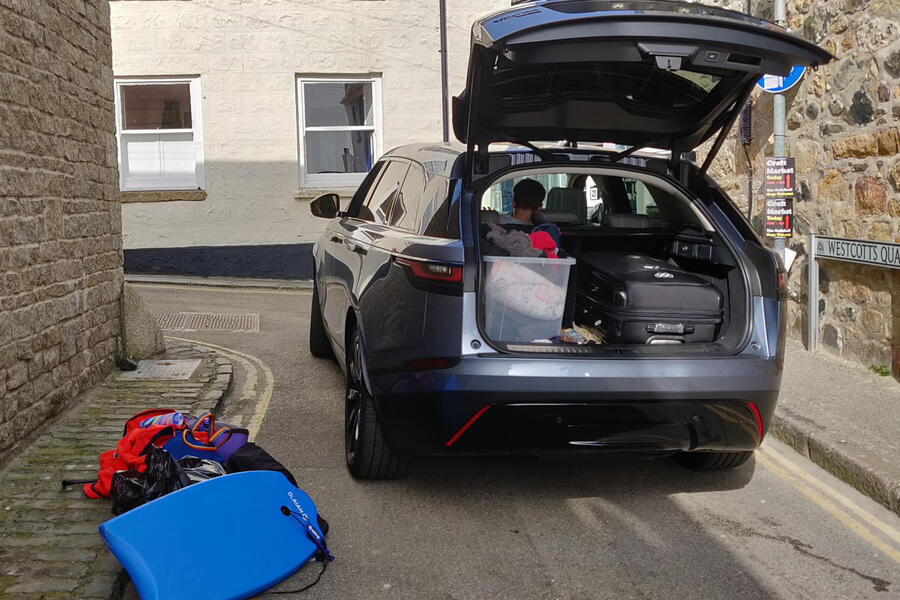
Yet when behind the wheel, you never forget it is a big car. "It's not necessarily the car you'd choose to take down the narrow cobbled streets of St Ives," said Jed, whose experiences tally with my own. So although it is a big car, it can become easy enough to place once you learn its extremities. But as I mentioned in its first report, it's still a harder car to place than the larger Range Rover/Range Rover Sport because the driving position is lower and further back and you're not as obviously aware of where the car's four corners are.
Jed was impressed with the economy and range, too. On longer journeys, you can nudge towards 40mpg and the big, 60-litre fuel tank means you're never wondering too much about where the next fuel station is. Only one fill-up was needed from south-west London to St Ives (not needing to stop to meet a man with seven wives) before pootling around Cornwall for some day trips, and then back, one done with an eighth of a tank left and costing Jed just £60.
So while the Velar is certainly an expensive car to buy, at least it's not a ruinously expensive one to keep moving.
Love it:
V6 engineThere's a smooth, easy-going nature to the V6 diesel powertrain that's not as laboured in its performance as four-pot Velars
Loathe it:
Infotainment glitchesLots of bugs already have required a few turn offs and on again. Feels like we've been here before with JLR's infotainment system.
Mileage: 13,490
Back to the top
Welcoming the Velar to the fleet - 23rd May 2018
Is it really two years old already? Because the Range Rover Velar, still a concept car made good for the road to my eyes, certainly doesn't look it.
However great the many challenges it faces are, let's not forget that Jaguar Land Rover still makes plenty of cars of huge desirability, few more so than those wearing a Range Rover badge.
We know plenty of the larger Range Rover and Range Rover Sport cars that continue to age gracefully and grow in popularity after the addition of plug-in hybrid drivetrains last year, and the recent Evoque replacement that has conquered all before it in double-quick time on this website.
But the Velar is the sibling we've had the least experience with. These next few months are all about redressing that and really getting to know Range Rover's middle child.
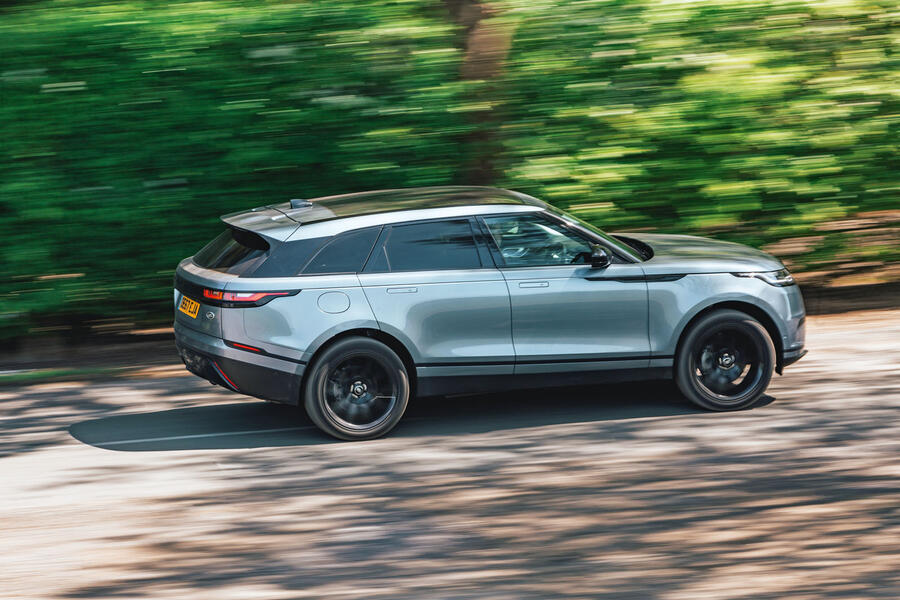
We say 'know least about', but it's still a relative term. The Velar has been through an Autocar road test, in 2017, and was awarded three and a half stars. The asking price and the quality of the car and componentry offered in return was the most limiting factor for a luxury SUV powered by a four-cylinder engine.
The Velar we've got on test right now is a 296bhp V6 diesel, which always felt a more natural companion for a car with premium, Range Rover-like aspirations, even if that price still induces a sharp intake of breath. The £68,110 sticker on our top-spec HSE model before options will find you mid-range, six-cylinder examples of the Audi Q8, BMW X6 and Mercedes-Benz GLE with change in your pocket – cars you'd consider more natural rivals for the Velar's Range Rover Sport big brother.
So this is the chance for the Velar – still a car of huge desirability and notable features, remember – to really prove its worth.
The Velar has made a steady start to life. In its first full year of sales in the UK, some 13,000 found homes. That's impressive, if not quite the 20,000 Land Rover had planned at its reveal in spring 2017, before falling demand for diesel and a depleted car market in general thwarted those ambitions.
Intriguingly, though, that's only ever so slightly more sales than the larger and more expensive Sport, a car that still feels like such a sweet spot in the Range Rover line-up and now very much flavour of the month with the aforementioned plug-in hybrid powertrain.
While the full-size Range Rover and Range Rover Sport are closely related, the Velar's DNA is more closely shared with Jaguar models. It's a sister car to the F-Pace, in a natively rear-drive aluminium architecture that's also found on the XE and XF saloons.
That means there's no hardcore off-road running gear, the Velar instead using a conventional four-wheel-drive system. The 3.0-litre V6 is hooked up to an eight-speed automatic, and while there's no low-speed 'box, the Velar should still go further than most of its peers off road with Land Rover's Terrain Response system and other electronic trickery.
It's unashamedly the most car-based model Land Rover has yet made, then – something that's evident not only in its technical makeup but also its long, low, sleek styling and low-slung driving position.
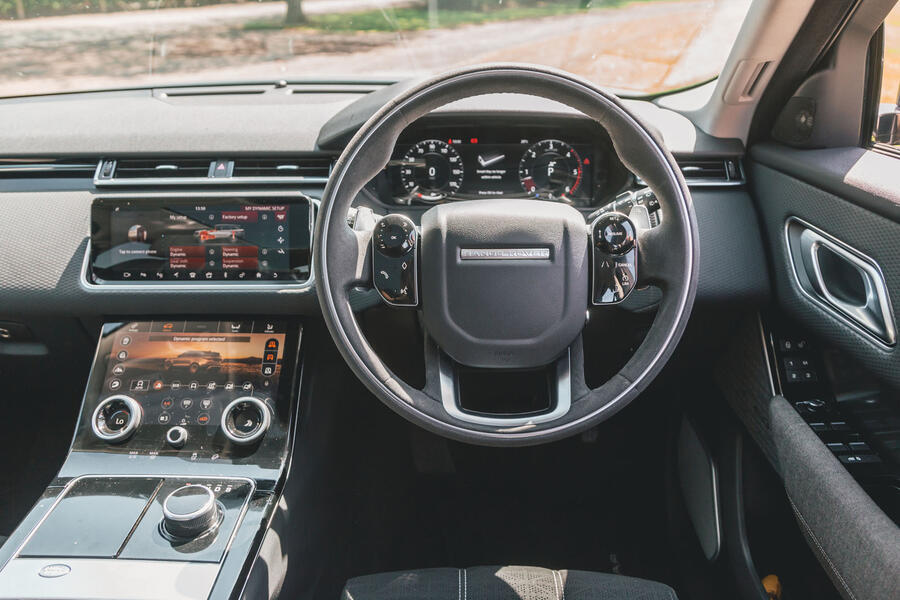
That's the first thing that strikes you about the Velar when you first sit in it: just how enveloped you are in the cabin with everything wrapped around you – the glasshouse is slim, the bonnet long and the seat far back. That's a real departure from the Range Rover norm, where you typically have an imperious, perched view of the road ahead and a view of each of the car's four corners, however large it is.
In that cabin you can also admire the Velar's other party pieces: the interior design, material use, technology and perceived quality. While the dual-screen layout has already made its way down to the Evoque, there remains a wow factor about this cabin and its modernity, something only enhanced by the absence of leather and the use of luxurious fabrics instead.
This being the range-topping HSE, all that comes at a cost, though. That the price tag starts with a six (well, a seven by the time you add up the options on our year-old, 10,000-mile test car) is intriguing in itself.
When Land Rover was busy showing us the Velar at its launch two years ago, it had plenty of charts to illustrate that as most buyers spent £40,000 on an Evoque and £80,000 on a Sport, there was a large hole in the middle where people wanting to spend £60,000 on a Range Rover couldn't do so.
Lower down the line-up you find JLR's four-cylinder Ingenium petrol and diesel engines in various states of tune, before you get to this V6. It was the range-topper of the entire Velar line-up until the recent announcement of the SVAutobiography model, complete with JLR's magnificent 542bhp supercharged 5.0-litre V8.
You can have the HSE trim even on the entry-level four-cylinder 178bhp diesel model – a £58,000 car itself – which shows that Land Rover perhaps considers the Velar's appeal to be in its materials and design as much as its technology. While it is possible to get a Velar for less than £45,000, that's still almost £10,000 more than the cheapest F-Pace.
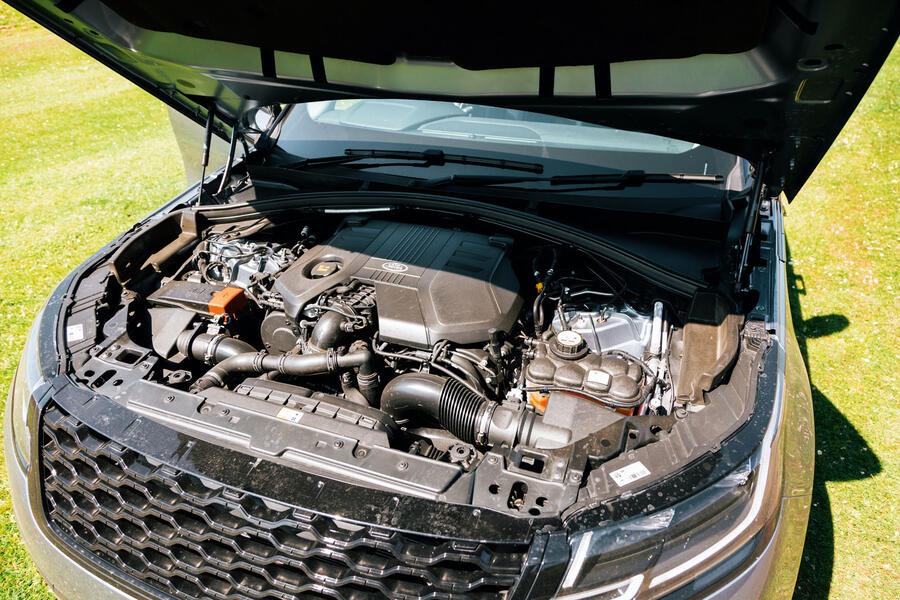
So there's no getting away from the fact that the Velar is an expensive car among its peers, yet Land Rover would argue a Range Rover will always look to command a premium. Whether it can or not is just one of so many stories and sub-plots to explore in our Velar over the next few months. Bring it on.
Second Opinion
The Velar's styling marked a new era for Range Rover – and, based on its sleek, grown-up looks, I wouldn't be surprised if it attracts a new generation of buyers, too. It's intended to sit between the Evoque and Range Rover Sport but, given its expense, I'm interested to see whether the Velar is a more appealing option to own overall than the original footballer's car.
Rachel Burgess
Back to the top
Land Rover Range Rover Velar HSE D300 specification
Prices: List price new £68,110 List price now £65,850 Price as tested £73,295 Dealer value now £44,612 Private value now £39,655 Trade value now £36,911 (part exchange)
Options:Byron Blue metallic paint £725, privacy glass £390, fixed panoramic roof £1115, 21in 10-spoke gloss black wheels £830, electrically deployable tow bar £985, Black pack £520, premium textile seats £620
Fuel consumption and range: Claimed economy 34.7-38.0mpg Fuel tank 66 litres Test average 36.5mpg Test best 40.1mpg Test worst 321mpg Real-world range 530 miles
Tech highlights: 0-62mph 6.1sec Top speed 150mph Engine V6, 2993cc, turbocharged diesel Max power 296bhp at 4000rpm Max torque 516lb ft at 1500rpm Transmission 8-spd automatic Boot capacity 558 litres Wheels 21in, alloy Tyres 265/45 R21 Kerb weight 2029kg
Service and running costs: Contract hire rate £622.74 CO2 169g/km Service costs none Other costs none Fuel costs £1782.52 Running costs inc fuel £1782.52 Cost per mile 17 pence Depreciation £31,199 Cost per mile inc dep'n £3.05 Faults none
Newsletter
Get all the best car news, reviews and opinions direct to your inbox three times a week. You can unsubscribe via any email we send See our full privacy notice for more details
Subscribe
Never miss an issue of the world's oldest car magazine – subscribe to Autocar magazine today.
Subscribe
Range Rover Velar 2019 Top Speed
Source: https://www.autocar.co.uk/car-review/land-rover/range-rover-velar/long-term-reviews/range-rover-velar-2019-long-term-review







Tidak ada komentar:
Posting Komentar